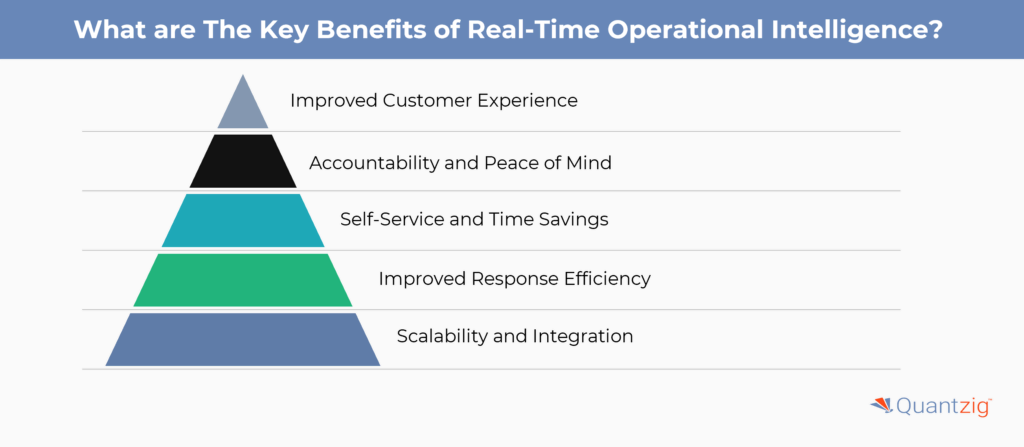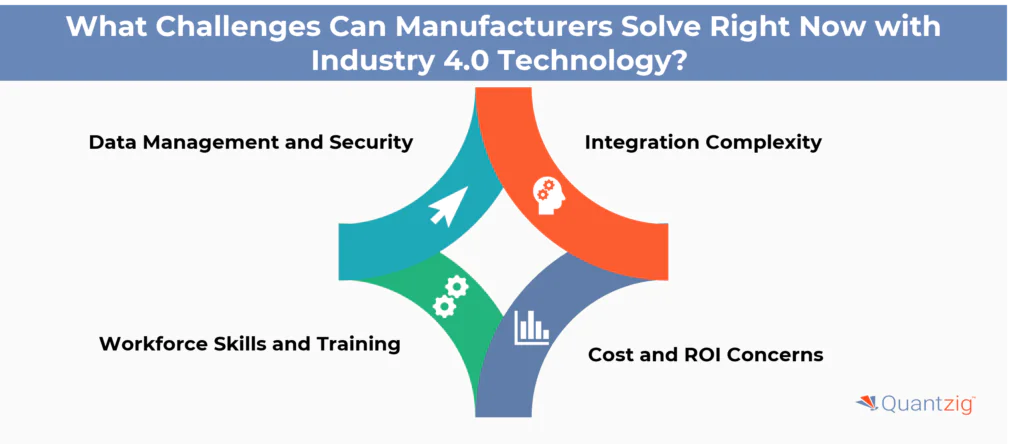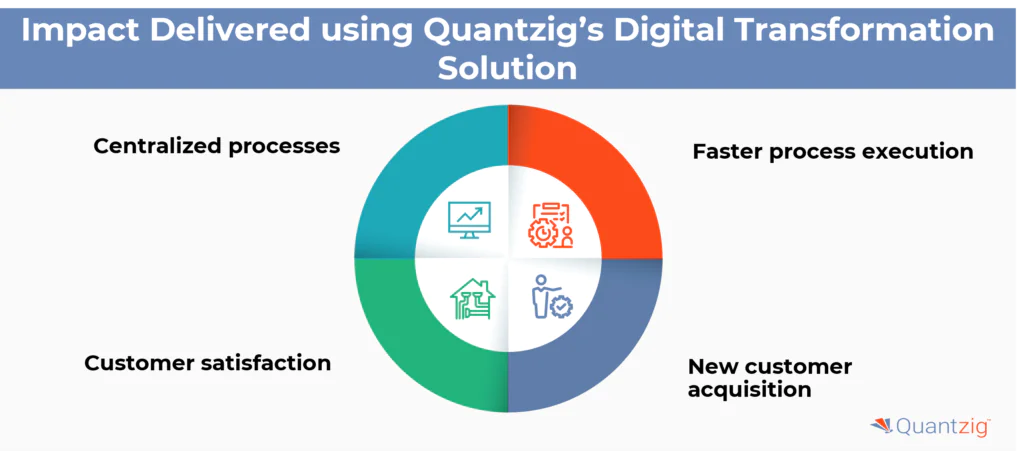Written By: Sudeshna Ghosh
Table of Contents
Key Takeaways
- Quantzig’s real-time operational intelligence solution helped a US-based retail brand to experience a 40% uplift in new customer acquisition and improve transparency across stakeholders.
- The Real-Time Operational Intelligence (RtOI) process involves systematically gathering, analyzing, and interpreting large amounts of data from various sources to provide real-time insights.
- Real-time operational intelligence solutions enhance customer experience, provide accountability and peace of mind, enable self-service and time savings, improve response efficiency, and offer scalability and seamless integration with diverse systems.
- Quantzig offers a wide range of data analytics solutions that include Data Engineering, Data Strategy Consulting, Business Analytics Services, Data Visualization & Reporting, and Business Process Automation.
Introduction to Real-Time Operational Intelligence
As the digital transformation of manufacturing is accelerating, it leads to faster processes and greater data collection than in the past. Modern factories are becoming more and more dependent on automated systems, advanced industry 4.0 technologies, and tools.
Manufacturing companies still face challenges with real-time end-to-end monitoring despite these advancements. Certain areas of the manufacturing floor continue to be opaque and segregated, making data inaccessible without halting production to examine machines in person. Real-time operational intelligence is what manufacturing’s digital transformation should ultimately aim to achieve. This kind of information can help improve productivity, cut expenses, decrease downtime, and more. What you should know is as follows. In this article, we’ll discuss how Real-Time Operational Intelligence can provide B2B organizations with the ability to transform many datasets into real-time insights that are all-time accessible.
Book a demo to experience the meaningful insights we derive from data through our analytical tools and platform capabilities. Schedule a demo today!
Request a Free DemoBut What is a Real-time Operational Intelligence Solution?

This technique refers to the ability to obtain, analyze, and process real-time data to enable companies to improve their business performance and make data-driven decisions. In other words, it can be said that this process is the ability to utilize data to make accurate decisions at the moment. RtOI is a subset of operational intelligence (OI) that makes decisions based on real-time data. Conventionally, OI has been defined as the reactive and proactive decision-making needed to manage ongoing operations. Reducing operating expenses, increasing situational awareness, and facilitating quicker decision-making are just a few of the many advantages of RtOI.
Why is Real-Time Operational Intelligence Important?
In the last decade, an innovative idea known as “real-time operational intelligence” has emerged and is quickly gaining popularity. By granting visibility throughout the entire manufacturing process, it aids many businesses in boosting productivity and uptime. The intention is to give businesses the capacity to convert vast volumes of data into always-accessible, actionable insights in real-time.
- The primary goal of this method is to avoid many accidents and save time. It aids businesses in spotting problems with their equipment before they become serious so that more intelligent preventive maintenance can be performed. This lowers the possibility of accidents, saving the business, clients, and staff time.
- This process also gives details about the equipment’s condition, performance, and potential maintenance needs for the plant and machinery. With the use of this data, possible issues can be found and fixed before they worsen and cause a calamity.
- To sustain a high degree of operational effectiveness, businesses must be able to anticipate and avert possible problems. Real-time operational intelligence is useful in this situation. Businesses can avoid maintenance issues by preventing and identifying them. It’s important to recognize past events and anticipate failures to respond appropriately and promptly. To put it another way, mistakes cannot simply be anticipated; rather, they must be recognized and addressed right away. In this manner, the business can boost revenue and decrease downtime.
What is The Real-Time Operational Intelligence (RtOI) Process?
This process systematically gathers, analyzes, and interprets a large amount of data produced by the operation of the plant to get real-time insights. It enables the operators to make data-driven decisions in a timely manner. Firstly, this process enables the manufacturers to decrease the manual time spent looking for and organizing what technologies can be identified instantly. Efficiency and productivity increase significantly as a result. Second, RtOI solutions make it easier to collaborate, increase visibility, and seamlessly capture knowledge. This improves the capacity to view insights alongside historical correspondence in a contextually relevant manner.
The following steps form the foundation of this process:
- Gathering information from sensors and additional sources, such as machines, people, and systems.
- Producing insights through the analysis of this data.
- Granting direct access to necessary information for stakeholders.
- Producing alerts when circumstances deviate from expectations.
- Alerting operators to these warnings.
- Analyzing the entire situation and making a detailed plan of action for dealing with those problems.
The process of Real-time Operational Intelligence is a more astute and proactive method of managing the shop floor. This approach makes use of data analytics to provide a comprehensive picture of the shop floor’s activities in real-time.
Initially, the process primarily accomplished straightforward tasks, like keeping machines from breaking down. These days, it’s applied systematically to more complex tasks across the entire factory, not just to save downtime but also to keep operators safe.
What are The Key Benefits of Real-Time Operational Intelligence?

The main benefits of integrating real-time Operational Intelligence (RtOI) solutions in the manufacturing plants are numerous.
1. Improved Customer Experience
By helping B2B businesses to proactively prevent problems and manage customer expectations, real-time operational intelligence solutions can greatly enhance the customer experience. For instance, a properly implemented RtOI solution can instantly provide the information a customer calls with questions about a transaction, eliminating the need for drawn-out searches and raising customer satisfaction.
2. Accountability and Peace of Mind
Additionally, these solutions provide B2B companies with a transaction history, providing them with a comprehensive view of their transaction lifecycle. They can confirm successful transactions and pinpoint issues due to this traceability, which offers accountability and comfort.
3. Self-Service and Time Savings
By giving users self-service capabilities, real-time operational intelligence (RtOI) solutions drastically lower the need for technical assistance for routine tasks like file retrieval. In addition to increasing user satisfaction, this autonomy frees up highly qualified technical staff from routine tasks so they can focus on important, high-impact projects. Organizations benefit from increased operational efficiency and productivity from reallocating important resources to innovation and performance improvement. The transition of RtOI towards self-service cultivates a more responsive workforce, which in turn propels the organization’s success and competitive advantage.
4. Improved Response Efficiency
RtOI solutions offer immediate visibility into operational metrics and key performance indicators, which significantly improves response efficiency. With the help of this real-time insight, problems can be identified and resolved more quickly, reducing downtime and increasing productivity. RtOI solutions aid in process optimization and risk mitigation by promoting proactive decision-making before problems worsen. Organizations can enhance their overall performance and customer satisfaction by promptly addressing and correcting operational anomalies, which guarantees continuous and seamless operations. A more flexible and resilient corporate environment is directly correlated with increased response efficiency through ROI.
5. Scalability and Integration
Real-time operational intelligence (RtOI) solutions are designed to be inherently scalable, accommodating the needs of both single manufacturing plants and complex multi-factory operations. Their architecture supports seamless integration with a diverse range of systems, including enterprise resource planning (ERP), manufacturing execution systems (MES), and Internet of Things (IoT) sensors. This interoperability enables cohesive communication and efficient data exchange across the entire organizational infrastructure, ensuring that data flows seamlessly and accurately. The scalability and integration capabilities of RtOI solutions enable businesses to expand and adapt their operations with ease, maintaining optimal performance and alignment with strategic goals as they grow. This flexibility is critical for sustaining long-term competitiveness in a dynamic market, where the ability to adapt quickly and efficiently is essential for success.
What Challenges Can Manufacturers Solve Right Now with Industry 4.0 Technology?

Industry 4.0 technology offers a wide range of benefits for manufacturers, from improved productivity and efficiency to enhanced flexibility and agility. However, implementing these technologies can also come with its own set of challenges. Here are some of the key challenges manufacturers can solve right now with Industry 4.0 technology:
1. Data Management and Security
One of the main issues facing manufacturers is how to handle and secure the enormous volumes of data that Industry 4.0 technologies generate. This entails preserving regulatory compliance, safeguarding against cyberattacks, and guaranteeing data integrity. Manufacturers can overcome these obstacles with the support of Industry 4.0 solutions, such as cybersecurity tools and data analytics platforms, which offer strong data management and security features.
2. Integration Complexity
The complicated and time-consuming process of integrating different systems and devices is another major issue that manufacturers must deal with. Manufacturers can simplify this process by using Industry 4.0 solutions, such as integration platforms and APIs, which offer smooth connections between sensors, data analytics platforms, and other systems.
3. Workforce Skills and Training
The need for skilled workers who can run and maintain these systems must be taken into consideration by manufacturers as they integrate Industry 4.0 technologies. Manufacturers can close the skills gap by implementing Industry 4.0 solutions, such as training programs and skill development initiatives, which equip workers with the abilities and know-how required to operate cutting-edge technologies.
4. Cost and ROI Concerns
Lastly, manufacturers must consider up-front expenses and long-term return on investment (ROI) related to Industry 4.0 technology implementation. Manufacturers can evaluate the financial impact of these technologies and make well-informed decisions about their implementation with the aid of Industry 4.0 solutions such as ROI calculators and cost-benefit analysis tools.
Manufacturers can gain a great deal from Industry 4.0 technology, including increased flexibility and agility as well as increased productivity and efficiency. But putting these technologies into practice can also present a unique set of difficulties. Manufacturers can smooth the transition to Industry 4.0 and benefit from this game-changing technology by tackling these issues with Industry 4.0 solutions like data analytics platforms, cybersecurity tools, integration platforms, training programs, and cost-benefit analysis tools.
Making a Business Case for Real-Time Intelligence
To make a compelling business case for investing in technology that provides real-time intelligence, leaders must focus on the tangible benefits it can bring to their organization. Here are some key steps to follow:
- Define the Problem: Determine which particular problems or inefficiencies—like better decision-making, higher customer satisfaction, or increased operational efficiency—real-time intelligence can help with.
- Quantify the Benefits: Make use of data to calculate the possible returns on investment, such as increased revenue, decreased expenses, or increased productivity.
- Emphasize Competitive Advantage: Stress how the organization can gain a competitive edge and stand out from rivals by utilizing real-time intelligence.
- Highlight Success Stories: Provide case studies or endorsements from other businesses that have effectively used real-time intelligence products.
By following these steps, leaders can create a strong business case for investing in technology that provides real-time intelligence, ensuring a successful and impactful implementation.
Quantzig’s Expertise in Real-time Operational Intelligence Framework for a US-Based E-commerce Retail Brand
| Category | Details |
|---|---|
| Client Details | An e-commerce retailer based in the United States with annual revenue of $10bn+. |
| Challenges Faced by The Client | The e-commerce retailer faced significant operational inefficiencies due to manual processes, stakeholder dependencies, and extended turnaround times for customer queries. |
| Solutions Offered by Quantzig | Quantzig offered solutions that included identifying high-impact processes for automation, creating a centralized platform with robust access controls and alerts, and developing a centralized AI-based auto-response platform leveraging natural language processing (NLP) to enhance customer service capabilities. |
| Impact Delivered | Improved transparency across stakeholders and reduced errors. Process execution was accelerated by 3x. Customer satisfaction increased by 70%, with 95% of customer queries responded to in less than 5 seconds. A 40% uplift in new customer acquisition. |
Client Details
An e-commerce retailer based in the United States was struggling with inefficient manual processes and stakeholder dependencies, hindering their ability to respond quickly to market changes and customer needs.
Challenges in Real-time Operational Intelligence Faced by the Client
The e-commerce retailer faced significant operational inefficiencies due to manual processes and stakeholder dependencies. These processes were error-prone, time-consuming, and hindered the organization’s ability to respond swiftly to market changes and customer needs. The client struggled with extended turnaround times for customer queries, which negatively impacted customer satisfaction and loyalty. Additionally, they faced challenges in initiating their digital transformation journey, including identifying the right starting point and selecting appropriate technologies.
Real-time Operational Intelligence Solution Offered by Quantzig for the Client
- Quantzig played a pivotal role in the client’s digital transformation journey by first identifying high-impact processes that needed automation. Through a meticulous assessment, Quantzig mapped out the stakeholders involved in these processes and delineated their respective responsibilities.
- Subsequently, they spearheaded the creation of a centralized platform equipped with robust access controls, alerts, and other essential functionalities. This platform served as a unified hub, ensuring that accurate and up-to-date information became readily accessible across teams and processes.
- By establishing a single source of truth, Quantzig enabled streamlined operations, reduced errors, and facilitated faster decision-making, ultimately alleviating the bottlenecks that had been hindering the client’s operational efficiency.
- Quantzig further revolutionized the client’s customer service capabilities by developing a centralized AI-based auto-response platform. This cutting-edge system harnessed the power of natural language processing (NLP) to swiftly decode and understand customer queries. Leveraging a comprehensive backend Q&A repository, the platform provided standardized responses to 95% of the queries in less than 5 seconds, ensuring rapid and consistent interactions with customers.
- For more complex queries, the system intelligently directed them to customer care executives for personalized assistance. This platform’s accessibility across various devices, including laptops, mobiles, and iPads, made it effortless for customers to engage with the brand, significantly enhancing the overall customer experience and bolstering the client’s reputation for responsiveness and reliability.
Impact Delivered Using Quantzig’s Expertise

The efficient data quality management led to significant improvements in the client’s operations and customer satisfaction. Key outcomes included:
- Centralized processes: Improved transparency across stakeholders and reduced errors.
- Faster process execution: Process execution was accelerated by 3x, enabling the client to respond more quickly to market changes and customer needs.
- Customer satisfaction: Customer satisfaction increased by 70%, with 95% of customer queries responded to in less than 5 seconds.
- New customer acquisition: The client saw a 40% uplift in new customer acquisition, driven by enhanced customer experiences and responsiveness.
Quantzig’s data quality management solutions empowered the e-commerce retailer to streamline operations, enhance customer experiences, and drive business growth. By leveraging automation, data-driven insights, and agility, the client was able to stay competitive and thrive in a rapidly evolving market.
Also Read: Understanding Omnichannel Marketing Analytics for Businesses
Get started with your complimentary trial today and delve into our platform without any obligations. Explore our wide range of customized, consumption driven analytical solutions services built across the analytical maturity levels.
Start your Free Trial TodayHow Can Quantzig’s Data Analytics Solutions Help B2B Businesses?
Quantzig’s comprehensive data management solutions empower organizations to harness the full potential of their data. Their portfolio includes a range of services designed to streamline data infrastructure, enhance accessibility, and ensure data integrity. Key offerings include:
- Data Engineering: Leveraging state-of-the-art industry frameworks, Quantzig simplifies data stacks, optimizing data flow and ensuring data integrity.
- Data Strategy Consulting: Quantzig crafts tailored analytics roadmaps, identifies process gaps, and introduces plug-and-play business acceleration modules to drive sustainable growth and informed decision-making.
- Business Analytics Services: Quantzig specializes in identifying solutions to complex business problems, enhancing performance across the entire value chain, and driving informed decisions.
- Data Visualization & Reporting: Intuitive, three-click visualizations simplify decision-making, providing actionable insights and driving efficiency across the organization.
- Business Process Automation: Custom apps streamline and automate business processes, reducing manual intervention and unlocking substantial time and cost savings.
By investing in Quantzig’s data management solutions, organizations can unlock the full potential of their data, drive innovation, and maintain a competitive edge in the market.
Also Read: Guide to Advanced Marketing Analytics Solutions and Its Business Benefits
Experience the advantages firsthand by testing a customized complimentary pilot designed to address your specific requirements. Pilot studies are non-committal in nature.
Request a Free PilotConclusion
Tapping the potential of real-time operational intelligence (RtOI) solutions is crucial for organizations aiming to achieve operational efficiency and cost reduction. By integrating business intelligence, Internet of Things (IoT), augmented reality, cloud computing, intelligent robotics, and big data, RtOI enables smart manufacturing and enhances overall equipment effectiveness (OEE). Leveraging data analytics and real-time monitoring provides actionable insights from real-time data, driving digital transformation and optimizing enterprise resource planning (ERP) systems. Ensuring robust cyber security further safeguards operations, making RtOI indispensable for modern, competitive businesses.



